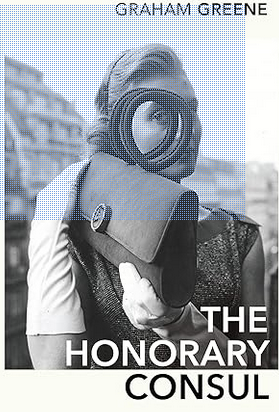
Set in Paraguay, presumably in the early 1970s since there is a reference to President Nixon, the central character proves not to be the “Honorary Consul” Charlie Fortnum, an alcoholic whose life revolves round “the right measure”, just enough whisky to blur reality without becoming unable to function. It is rather the “young” Doctor Eduardo Plarr, who seems quite middle-aged in his cool, cynical assessment of the world, and avoidance of emotional involvement when seducing other men’s wives, between visits to the local brothel. This is while clearly being a dedicated doctor, caring for the poor in the town he has chosen to inhabit, on the border with Paraguay. This seems to be the key to his detachment, stemming from the childhood trauma of having to escape with his mother to safe exile in Argentina, with his last memory of a father refusing to accompany them, preferring to risk long-term imprisonment as a political dissident.
The slow-paced novel focuses initially on the often mundane details of Plarr’s daily life, leaving readers to deduce some of the most dramatic events, to the extent that we keep thinking some vital point must have been missed. So it turns out that, motivated by an apparent opportunity to get his father out of prison, Plarr has collaborated with a group of political activists he happens to know from his school days. He has provided vital information for a plot to kidnap a visiting American ambassador, a valuable bargaining counter in negotiating the release of political prisoners, hopefully including Plarr’s father. This is in contradiction to the fact that we have been given to understand at the outset that Plarr’s father is already buried somewhere in Paraguay.
It soon becomes clear that the scheme has been bungled, with the far less valuable Charlie Fortnum captured in error. Plarr is faced with the practical and moral dilemma of how far to go in trying to remedy the situation, his motives complicated by the fact that he is having an affair with Charlie’s wife Clara, a former prostitute whom the Consul has married, to the disapproval of his social circle.
“The Honorary Consul” has been described as one of Graham Greene’s finest novels, and was apparently a favourite of his amongst his own works. So I was disappointed to find it wanting in comparison with his “The Quiet American”, to which I turned recently with relief as an antidote to some over-hyped, overlong current bestsellers.
If you are familiar with “The Quiet American”, you will see parallels in the two stories: Plarr and the cynical journalist Fowler; well-meaning but flawed Fortnum and the naïve young American Pyle; the local women Clara and Phuong, dependent on men to give them security, and so on. However, whereas the former conveys a powerful sense of place, and the culture of 1950s Vietnam, together with a strong development of the main characters, and the narrative drive which reveals their mixed motives, “The Honorary Consul” is less absorbing. This may be because the places, like the town where the story is mainly set, which Greene left unnamed “so as not to be tied down” are portrayed less vividly. The characters seem less convincing, more two-dimensional or caricatured. Written in the third person, there is too much of a tendency to “tell” readers about events (in a disjointed fashion) rather than “show” what they might deduce for themselves.
The drama of a potentially tense climax leaks away: while the survival of everyone directly concerned hangs in the balance, Plarr and Father Leon, the lapsed priest leading the band of kidnappers, indulge in lengthy, incongruous philosophical discussions about having, or renouncing, the Catholic faith in which they were brought up. Perhaps this is meant to be more of a novel of reflection on conflicting ideas and reactions, rather than a tense psychological drama, but with the added element of cynical farce, the reader is pulled simultaneously in too many directions.
Another interesting aspect is the extent to which the male chauvinism, bordering on misogyny, may have been an aspect of Greene’s own personality. Charlie’s wife Clara is portrayed as a sweet young woman who seeks to please men in exchange for what they are prepared to give her. Yet at their last meeting, she seems to be expressing a genuine love for Plarr which he is too emotionally damaged to return. Is it possible that he really does not take in the crucial question she asks him, because he thinks that “The only questions of importance are those which a man asks himself”?
With eighteen years between the publication of these two novels, and Greene approaching seventy when “The Honorary Consul” appeared, did he lack the motivation to hone the latter to realise its full potential? Perhaps one needs to know and care about Catholicism to appreciate what seems like a digression from the other moral questions and human failings that this novel seeks to portray and explore – but somehow fails to get to “the heart of the matter”.